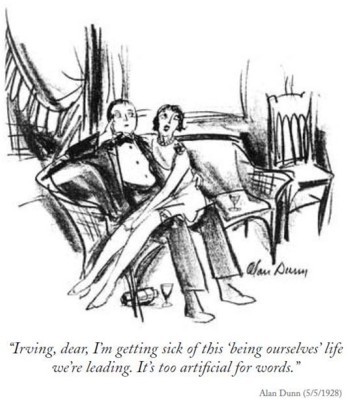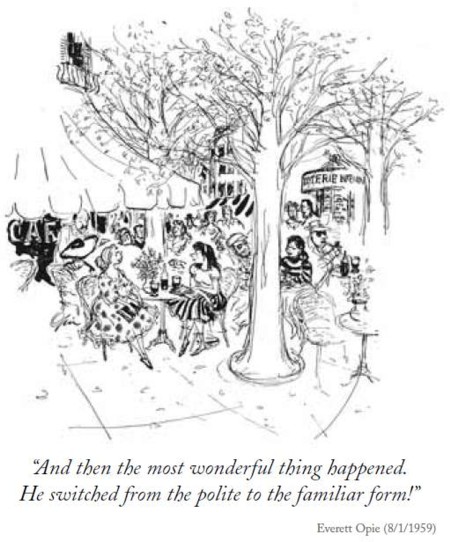Experience
We learn from experience that men never learn anything from experience[13]
Our ideas and words may be what define us human but ideas do not make us alive. Other animals, plants and even individual cells are alive. Many of these living things could be described as more successful, individually, than we are. Some trees are longer-lived, much larger and command more of the earth's resources than we do.
All living things experience life; they may not be able to put this into thoughts or to have complex ideas but to survive they must be able to respond to their environment and have at least some sort of memory. At the simplest level this memory might be just that those individuals that respond appropriately survive and so this survival strategy is stronger in their group.
We might argue that a tree or bacterium can experience events without comparing the experience with an earlier one or without trying to work out what it means; but even they seem to learn from experience and to respond to their environment. The more complex the plant or animal the more need it has for learning and to be able to respond to its environment (or vice versa).
Quite a few animals seem to experience life very much like we do. They seem to have feelings and emotions. When we watch a cat lying in the sun or when we play with a dog, we feel that we understand their experience; it's like our own.
We know or feel that animals have some kinds of thoughts; they tell us that they want food or to go for a walk; they have friendships and enemies; they find ways of doing things without being taught. Some animals seem to have more complex thoughts than others. Many animals respond appropriately to circumstances they have never encountered before. Cats are very good hunters; dogs can round-up sheep; chimps, other apes and some monkeys have self-awareness similar to ours and appear to empathise with others.
In our culture it is common to hear feelings contrasted to ideas or beliefs. Listening to the radio the other day I heard an interview with an ex-priest (now dying of AIDS) who was asked about his belief in God. He replied that, 'I no longer believe in God; I now 'experience' God'. Children may be told to 'experience life' or to 'get in touch with their feelings'. In Star Wars Luke is told to 'Let Go! Feel the Force'.
The idea that pure experience is the essence of living is very old and is still very common. A number of religious sects practice abstinence, physical hardship or pain to achieve a greater awareness of God or 'reality' or 'self'.
Followers of the Marquis de Sade believed that 'natural' passions even of a sexually harmful, painful or brutal kind should be embraced to live life to its fullest. Hippies of the nineteen sixties like Timothy O'Leary argued that reality was heightened when he was 'high' on acid or other drugs.
Epicureans, followers of the teachings of the Greek philosopher Epicurus, argued that pleasure is the supreme good and main goal of life (and an antidote to fear of the afterlife). Epicurus preferred intellectual pleasures to sensual ones but later followers often reversed this.
Many ordinary people believe that their life is best understood as a series of experiences; meeting friends, swimming, eating, missing the bus, visiting Rome, getting caught in the rain and so on.

Some believe that they are only living to the full when they are having some extreme experience. They might like risking physical injury or like extreme sports like skydiving, bungee jumping or white water canoeing. They may like taking financial or sexual risks or they might take drugs or like to party. Some of these look for ever stronger experiences: sexual; pleasurable; mind altering; or painful. Sado-masochists, serial killers, sexual enthusiasts, seekers of religious ecstasy, drug takers, gamblers, sport and exercise addicted and even the lovers of fine foods are each in their way living for the next experience.
Others believe that religious experience, revelation, or the experience of nature (getting back to nature), is the only thing we can really know.
Counselling and psychoanalysis and many 'New Age' and religious 'formulae for living' stress 'feelings' over 'analysis'. Some of the adherents believe that experience is only real when it is about feelings, emotions, reactions, which are thought to be different to ideas, thinking or 'intellectualising'.
When we watch children growing we can see that they feel things in a 'purer' way than do adults; they have the feelings they were born with, with little or no thought involved. These feelings might be pleasure in snuggling or suckling; or a pain in the tummy.
It used to be popular in Europe to believe that wild humans 'savages' were 'children of nature' and lived entirely by experience; that they had no deep or civilised ideas that corrupted their innocence. Of course this belief in the 'Noble Savage' quickly evaporated when people got to know other races and discovered that they have just as many ideas and complex beliefs about the world as Europeans do.
Similar arguments were made by the educated (the writers and recorders) about people of different classes; the working classes were supposed to experience life rather than think about it; intellectuals were incapable of experiencing life as it 'really is'.
Typical of this view was the English author DH Lawrence who argued that ideas can get in the way of experience and that this was a kind of failure to live. According to Lawrence, and many other writers, the rural workers of the past were nearer to living life 'as it should be lived' because its members were not (believed to be) so bound up in ideas or knowledge. Nor were they sacrificial to the money god, like the new middle class (although they may have been seen as beasts or cannon fodder to their masters).
The car ploughed uphill through the long squalid straggle of... blackened brick dwellings, the black slate roofs glistening their sharp edges, the mud black with coal-dust, the pavements wet and black. It was as if dismalness had soaked through and through everything. The utter negation of natural beauty, the utter negation of the gladness of life... all went by ugly, ugly, ugly... Primitive chapel, primitive enough in its stark brick... Wesleyan chapel... of blackened brick Congregational chapel... the new school buildings... gravelled playground inside iron railings... the suggestion of a chapel and a prison. Standard Five girls were having a singing lesson...: a strange bawling yell that followed the outlines of a tune. It was not like savages: savages have subtle rhythms. It was not like animals: animals mean something when they yell. It was like nothing on earth, and it was called singing... What could possibly become of such a people, a people in whom the living intuitive faculty was dead as nails, and only queer mechanical yells and uncanny will-power remained?[14]
This was written in 1928, similar passages can be found in contemporary American literature like 'The Great Gatsby' where industrialisation is a kind of corruption and the 'Great War' had recently displayed its horrors.
Writers like Lawrence argue that we should just experience the beauty of a flower without analysing it; as soon as we classify it eg by counting its petals we are intellectualising it and this destroys the purity of our initial experience; its beauty. Modern science is to be feared - we should get back to our animal (natural) roots.
This all sounds quite reasonable; I can experience life without thinking too much about it; but can I? Isn't all our experience felt in the context of previous experiences and our ideas, physical condition and knowledge?

Can we apply the same rules to music or a painting? These were created through the ideas of their makers. Surely we understand and appreciate the work better if we know something about music or painting? Our enjoyment is improved not destroyed. I would argue that the same is true in nature; more understanding increases the value and enjoyment of our experience.
If I show you a spider or a snake you may experience fear but only if you have something in your past that makes you fear spiders or snakes. You can just as easily be taught to experience wonder or admiration of nature. If you have a snake as a pet you may feel protective and loving towards it.
When you ski you may feel quite comfortable or have no particular emotion when others experience fear. As you get more experience things that once scared you are no longer frightening. This is why some people, who want to feel daring, need to do more and more dangerous or difficult things.
All our feelings are like this: we can only experience them in relation to other feelings. There is no doubt that we can just enjoy those things that animals do; relaxing, physical exertion, sleep and so on, but as soon as we start relating to others or to our own past we are dealing with ideas.
Friendship, love, hate, laughter, excitement, sorrow, fear, pain, pleasure, birth, sex, death and revelation are just some of the feelings that signify human experience; but can we feel any of these without recalling a past experience or something we have been told; without it depending on ideas and leading to knowledge?
Later in this essay I am going to look at some of these ideas in more detail. Then I hope that you will agree with me that our experiences are very bound up with our ideas. Once our brain has begun to grow we humans can't have pure experiences; every experience is felt in the context of our ideas formed by past experience, our inherited characteristics (eg taste preferences, innate fears, sexuality) and the things we have been taught.
Because our nerves take a finite time to communicate and our brain takes time to register these feelings, everything that happens to us is a recollection of something in the past. As we shall see, it is clear that 'I' am a result of a complex interaction of thoughts and experiences. What's more, the senses that give me information do so through a lot of processes before the conscious 'I' gets that information. Sometimes this takes microseconds and at other times, minutes. You know the joke:
'How do you make a blond laugh on Monday?
...Tell them a joke on Friday'.
Everything we know comes to us via our senses but, unlike some organisms, we humans can never have any experience that is not is felt in the context of our previous experiences or subject to our existing ideas. Indeed far from seeking 'pure' experience it is human to seek understanding; and it is the quest for knowledge and understanding that distinguishes us from animals.

